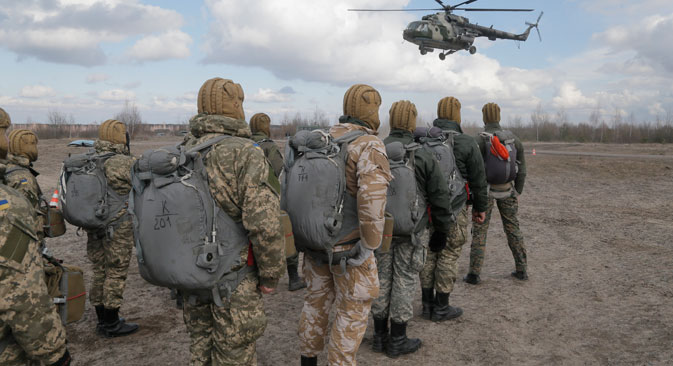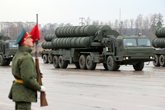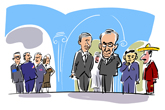Press Digest: Merkel influences Obama’s view on supplying weapons to Kiev

Ukrainian army soldiers perform a military exercise at a training ground outside Zhitomir, Ukraine, on March 6. Source: AP
Obama questions supplying weapons to Ukraine after meeting Merkel
The Moskovksy Komsomolets daily reports that U.S. President Barack Obama has changed his mind about supplying weapons to Ukraine after meeting with German Chancellor Angela Merkel.
Although the meeting took place a month ago, details of the conversation are only being made public now. According to the German Ambassador in Washington, Peter Wittig, Obama agreed at a meeting with Merkel "to give some space for those diplomatic, political efforts that were underway."
"The two leaders exchanged views on that issue and there was unity by them not to impose, or not to go forward with, the delivery of lethal defensive weapons at this time," Wittig said, according to the newspaper.
However, Moskovksy Komsomolets stresses that senior U.S. military officials and congressional leaders are still discussing supplying defensive weapons to Kiev. A bill is making its way through the U.S. Congress to provide a billion-dollar military aid for Kiev until 2017, including the supplies of defensive lethal weapons.
The EU considers creating its own army
Head of the European Commission Jean-Claude Juncker has suggested that the European Union should create its own army, according to reporting by news website Gazeta.ru. The initiative has already found support from a number of German politicians in particular.
Russian experts interviewed by Gazeta.ru suspect that the proposal will face strong opposition from the United States and NATO.
Sergei Utkin, head of the Strategic Assessments Department of the Russian Academy of Sciences' Center for Situational Analysis, said that Juncker's proposal isn’t surprising, as Juncker is a strong supporter of deepening the integration process within the EU. However, Utkin stressed that the "creation of a full-fledged European army could theoretically allow to significantly optimize the EU's defense spending."
Additionally, the different perspectives with in the EU of the threat posed by Russia could also play a role in the debate, according to Utkin. European countries with the most critical attitude toward Russia could reduce the level of support for defense cooperation within the EU, focusing resources on initiatives of NATO, Utkin said.
Fyodor Lukyakov, chairman of the Council on Foreign and Defense Policy, stressed that the idea of the creation of a separate European army and plans for European strategic independence have been talked about since the 1950s. Lukyanov stressed, however, that these ideas directly conflict with the purpose of NATO, and therefore are likely to come to fruition.
EU divide over Russia sanctions grow
Pro-government Russian daily Izvestia writes that more and more European countries are opposed to the extension of sanctions against Russia. According to the paper, some EU countries are set to ease the sanctions policy towards Russia and revive bilateral relations. However, there is concern that pressure from the U.S. will not allow the European Union to move toward the normalization of relations.
Oleg Nemensky, a senior researcher at the Institute for Strategic Studies, told Izvestia, "The sanctions are costly for Europe, but the conflict with the United States on several issues will cost much more.”
According to Nemensky, for the EU to side with Russia would mean a geopolitical revolution and the creation of a “big Europe” including Russia. "Such a prospect is impossible to even consider in the foreseeable future," Nemensky said.
Konstantin Zulin, director of the Institute of CIS Countries, agrees with Nemensky. According to him, Washington's closest associates in the EU will not be allowed to ease restrictive measures. However, Zulin also said that new sanctions will not be imposed.
All rights reserved by Rossiyskaya Gazeta.
Subscribe
to our newsletter!
Get the week's best stories straight to your inbox

